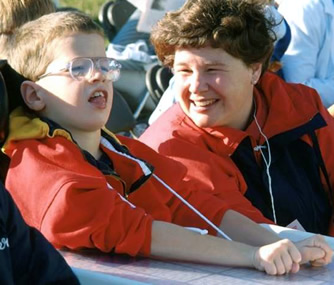

Preschoolers with CP are entitled to a free, appropriate public education, in the least restrictive environment, with peers who are typically developing as part of the Individuals with Disabilities Education Act (IDEA). This means that "all" children can attend and benefit from the same child care programs. It means that children with disabilities go to the same programs they would attend if they did not have a disability.
"Every child deserves a safe, healthy, and stimulating childhood." (FPG Child Development Institute)
Including Samuel is a documentary that chronicles a family's efforts to include their son with CP in every facet of their lives. Click the link to view a 3-minute trailer.
Children with CP are referred to Early Intervention and are eligible under the IDEA Other Health Impaired category. Children with CP often obtain related services to help them receive an education. Services are determined through a timely and extensive evaluation and the child's needs are outlined in an Individual Family Service Plan (IFSP). a written document created by a team of professionals and the parents that outlines the supports and services a child with a disability and their family will receive.

Depending on the severity of the CP and needs of the child you may be working with several related service providers. These specialists may include:
Below are some examples of things a child with CP might need to be successful in an early childhood setting:
In addition to these physical needs in the education setting, children with CP may need assistance with emotional issues such as social integration and peer relationships. Special attention to these issues may be needed at each new developmental level as a physical disability can impact body image and self-esteem.
For example, in Martha's preschool classroom, the children are making milkshakes in a blender. Martha has adapted the blender with a simple single switch device. Children measure and add the ingredients to the blender. Joey, a 4-year-old with CP, then activates the switch on cue from one of his peers and the milkshakes are made. This example gives Joey an opportunity to participate with his peer in both an educational and fun experience.
The Teaching Research Institute | 345 N. Monmouth Ave. | Monmouth, OR 97361 | Voice: 503-838-8785 | Fax: 503-838-8150
To increase font size, click "Control" and "+" for PC, "Command" and "+" for MAC.